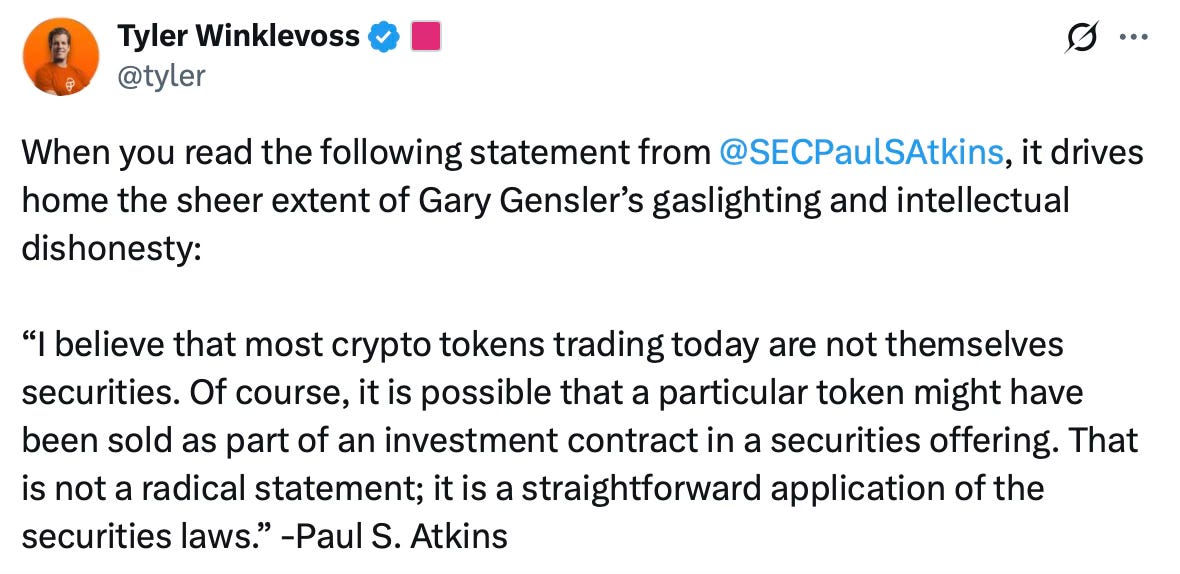First XRP Spot ETF Makes a Big Splash on Wall Street
Canary Capital’s XRPC posts 2025’s biggest ETF debut with $245 million in inflows
Welcome to the Friday edition of the Crypto In America newsletter!
What you’ll read: Canary Capital’s XRP ETF breaks records on its Wall Street debut, SEC Chair Atkins unveils next steps in Project Crypto, and the week’s top stories.
Following its Thursday debut on Nasdaq, Canary Capital’s XRPC, the first pure-play XRP spot ETF on Wall Street, posted the biggest launch of the year with the largest day-one trading volume for any ETF in 2025.
At $59 million, it narrowly surpassed Bitwise’s $57 million debut for its BSOL ETF last month, which had held the top spot among 900 ETF launches so far.
“Doing it on a down day like today is pretty impressive,” said Bloomberg Intelligence Research Analyst James Seyffart, referring to Thursday’s sharp decline in equities, which marked their worst day in over a month amid a broad tech selloff.
Bloomberg Senior ETF Analyst Eric Balchunas added that XRPC and BSOL are in a league of their own, with third place more than $20 million behind, highlighting strong investor appetite for regulated altcoin investment products.
XRPC also saw $245 million in inflows, meaning investors poured that amount into the ETF on its first day of trading. For comparison, BSOL attracted $69.5 million on its debut.
SEC Chair Unveils Project Crypto Updates and New Token Taxonomy
SEC Chair Paul Atkins delighted the crypto world this week by unveiling the latest updates from Project Crypto, the SEC Crypto Task Force’s initiative to establish a regulatory framework for digital assets, including a token taxonomy and the idea that “promises may not remain forever.”
Atkins was, of course, referring to the decades-old Howey Test, which securities lawyers have long used to determine what counts as a security. Speaking at the Philadelphia Fed’s Ninth Annual Fintech Conference on Wednesday, he outlined the SEC’s new approach, applying Howey more flexibly to fit the unique nature of digital assets. An asset becomes a security only when tied to a specific contract, and once that contract ends, it may no longer be a security, he said, with many tokens starting as investment contracts but “graduating” as networks mature and issuers step back.
Atkins revealed that the Task Force is developing a framework to categorize crypto assets. Network tokens, digital commodities, NFTs, collectibles, and utility tokens are generally not considered securities, while tokenized stocks and bonds are. He also emphasized flexibility for innovation: non-security tokens could trade on CFTC- or state-regulated platforms, giving creators more options while keeping investors protected.
“A reasonable Commission approach to crypto will not by itself decide the fate of the market — or of any particular project. Markets will do that. But it will help to ensure that the United States remains a place where people can experiment and learn, fail and succeed, under rules that are both firm and fair,” he said.
Atkins’ speech drew praise from industry players, who highlighted the contrast between his more flexible approach and the rigid stance of former SEC Chair Gary Gensler, who viewed all digital assets, aside from Bitcoin, as securities.
Paradigm’s VP of Regulatory Affairs, Justin Slaughter, noted that the speech could help advance a market structure bill in Congress, where lawmakers are currently working to clarify token classification as part of the legislation.
Invest as you spend with the Gemini Credit Card®. Get approved to earn $200 in Bitcoin. Issued by WebBank. Terms apply.
Weekly Recap
ICYMI. Here are the biggest news stories this week from the intersection of Washington and Web3:
The longest government shutdown in history ended after 43 days, as seven Democratic senators and one independent crossed the aisle to strike a spending deal with their Republican colleagues.
The Senate Agriculture Committee released its long-awaited bipartisan crypto market structure discussion draft. Chairman Boozman (R-AR) said he is committed to marking up the bill in early December.
The Senate Agriculture Committee scheduled a nomination hearing for CFTC Chair nominee Mike Selig on Wednesday, November 19.
SEC Chair Paul Atkins unveiled the next step in Project Crypto, including a token taxonomy plan to modernize crypto regulation.
The Treasury Department and IRS issued new guidance creating a safe harbor for crypto ETP trusts to stake assets without jeopardizing their grantor trust status, opening the door to allocators who might otherwise avoid the tax risk.
Pro-crypto lawyer John Deaton, who lost to Senator Elizabeth Warren (D-MA) in 2024, announced he’s running again in the midterms, this time against Massachusetts’ junior senator, Ed Markey.
MoonPay launched its enterprise stablecoin platform that allows companies to issue and manage stablecoins across multiple blockchains.
SoFi became the first nationally chartered consumer bank in the U.S. to allow members to buy, sell and hold 30 cryptocurrencies directly within its app.
Coinbase announced it’s leaving Delaware to re-incorporate in Texas, citing the state’s more favorable business laws.
Canary Capital launched the first XRP ETF on Nasdaq, the largest ETF debut of the year, edging out Bitwise’s Solana ETF with 59 million dollars in day-one trading volume and $245 million in inflows.
JPMorgan launched its blockchain deposit token, JPM Coin, on Base for institutional clients, allowing near-instant transfers.
Polymarket partnered with UFC to integrate on-chain prediction data and real-time betting into live fight broadcasts.
Remember, new editions of the Crypto In America newsletter drop every Monday, Wednesday and Friday at 7AM EST.
If you like what you’re reading, don’t forget to subscribe!








Yep. The good XRP news caused a 10% price drop.
The $245M in first day inflows beating even Solana's ETF is pretty remarkable. What I find most intresting is how this happened during a broad tech selloff too. The contrast between Atkins' flexible aproach with the token taxonomy framework and Gensler's rigid stance realy shows how much the regulatory enviroment is shifting. The fact that institutional demand stayed strong despite market conditions suggests there's real appetite for regulated altcoin products.